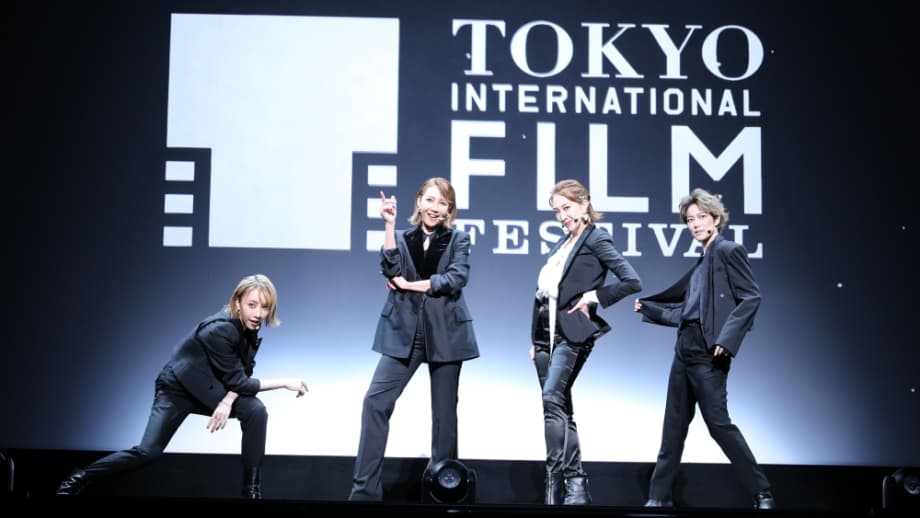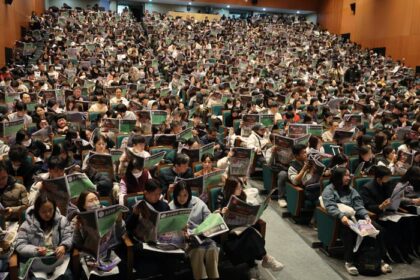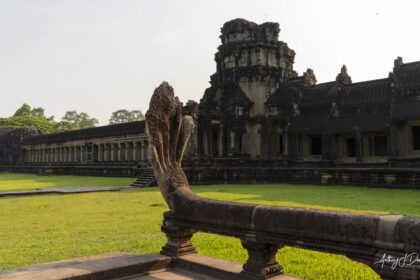A star filled opening in central Tokyo
Tokyo rolled out the red carpet as the 38th Tokyo International Film Festival opened in the heart of the city, with events centered around Hibiya, Yurakucho, Marunouchi and Ginza. On a clear autumn evening, a diverse lineup of Japanese and international talent greeted fans and photographers before the gala screening. French icon Juliette Binoche, Chinese star Fan Bingbing, and acclaimed Japanese performers including Sayuri Yoshinaga and Kumi Takiuchi joined filmmakers, producers and industry leaders to kick off one of Asia’s most visible showcases of cinema. The festival runs through November 5 (2025), with screenings and talks across multiple venues in central Tokyo.
The opening night film, Climbing for Life, is a biographical drama about Junko Tabei, the first woman to reach the summit of Mount Everest. Directed by Junji Sakamoto, the film stars Sayuri Yoshinaga, a four time Japan Academy Award winner who has appeared in more than one hundred films. Yoshinaga received a festival Lifetime Achievement Award during the ceremony, a milestone honor for a Japanese actress at this event. Co star Rena Nonen, who portrays the younger Tabei, joined Yoshinaga and Sakamoto on the carpet as the film drew a warm welcome from the home audience.
Organizers say this year’s edition will screen 184 films, anchored by a competition of 15 titles selected from 1,970 submissions spanning 108 countries and regions. The numbers reflect a firmly international outlook while maintaining a strong platform for Japanese cinema. Festival navigator Kumi Takiuchi took part in the opening program, reinforcing a now familiar Tokyo tradition of pairing red carpet glamor with filmmaker conversations that connect audiences to the craft of cinema.
Government backing and international partnerships added extra weight to the opening ceremony. Japan’s State Minister for Economy, Trade and Industry Toshiro Ino addressed attendees with plans to boost screen production and global outreach from Japan.
“Japan will be the country of honor at Cannes Marche du Film in 2026, and we are launching a new Minister’s Award to recognize outstanding film commissions,” Ino said.
Competition, sections and premiere highlights
The international competition brings together 15 films that represent a wide range of styles and regions. Two Japanese titles are in the mix. Yuichiro Sakashita’s Blonde, a Japanese school set comedy, arrived with its cast in matching outfits and dyed hair, eliciting cheers from the stands. Ryutaro Nakagawa’s Echoes of Motherhood features celebrated director Naomi Kawase in a rare acting role. These domestic entries sit alongside new work from across Asia and Europe, including Mother Bhumi, a competition title featuring Fan Bingbing and directed by Chong Keat Aun.
Beyond the race for the Tokyo Grand Prix, the program spans core sections that regular attendees will recognize, including Asian Future, Nippon Cinema Now, World Focus, Gala Selection, Animation, Japanese Classics, Youth and TIFF Series. A Women Empowerment showcase continues to highlight films by female directors and female centered stories, building on momentum from recent editions. The festival also hosts talks, master classes and industry sessions designed to connect creators and audiences with the latest ideas in craft and production.
One of the week’s most talked about special screenings is Mishima: A Life in Four Chapters, Paul Schrader’s 1985 film about the writer Yukio Mishima. The film is receiving a rare public screening in Japan during the festival, decades after its United States release. Schrader introduced the presentation with a wry aside to the Tokyo audience.
“Don’t blame America for Donald Trump!”
Jury leadership and what it signals
This year’s competition jury is led by Carlo Chatrian, the former artistic director of the Locarno and Berlin film festivals. Chatrian is known for programming curiosity and for an inclusive approach to festival governance, including a shift at Berlin from gendered acting prizes to gender neutral performance awards. His appointment underscores Tokyo’s intent to position itself as a vital meeting point for filmmakers and audiences with a broad international outlook and a deep interest in Japanese cinema.
Chatrian has long standing ties to Japan through retrospectives, animation programs and prior visits to the festival. In an official message, he called the role an honor and outlined his hopes for the selection and the conversations that will follow with fellow jurors.
“It is a great privilege to chair the jury of the Tokyo International Film Festival. I am looking forward to discovering the selection and engaging with fellow jurors.”
Market week: TIFFCOM opens for business
Running alongside the festival, TIFFCOM returns from October 29 to 31 as the industry hub for rights deals, development partnerships and production finance. The market takes place in the Hamamatsucho area, drawing buyers, distributors, streamers and producers who are scouting Japanese and Asian content for theaters and platforms worldwide. Organizers report a surge in international participation in the previous edition, including a sharp rise in overseas attendees and more on site negotiations that extended well beyond completed titles.
Amid a global surge in adaptation of Japanese stories, TIFFCOM is expanding its focus on intellectual property. The Tokyo Story Market is being reintroduced as the Tokyo IP Market: Adaptation and Remake, a dedicated forum for publishers and rights holders to meet producers seeking to adapt manga, novels and other works. The Tokyo Gap Financing Market supports feature film projects seeking final funding, giving emerging and established creators a place to match projects with financiers.
Yasushi Shiina, vice president of Unijapan and CEO of TIFFCOM, described the event’s role in Asia’s content economy and its connection to global audiences.
“We are proud that TIFFCOM continues to play a vital role as a hub for content business in Asia and as a gateway for Japanese audiovisual content to expand globally,” Shiina said.
Kaori Ikeda, managing director of TIFFCOM and Unijapan, highlighted how the new IP focus aligns with financing support to accelerate production.
“Together with the Tokyo Gap Financing Market, which supports financing for feature films, we hope TIFFCOM will serve as a key platform to connect Japanese and international producers interested in adaptations and help bring new audiovisual works to life,” Ikeda said.
Security and spotlight in the capital
The opening night unfolded amid heightened security, as the festival coincided with a visit by United States President Donald Trump. Authorities deployed a large number of police and security staff around central Tokyo, particularly near the Imperial Palace and major hotels. The schedule includes ceremonies and meetings with Emperor Naruhito and Prime Minister Sanae Takaichi. The security footprint did not dampen attendance on the carpet, where filmmakers and fans continued to engage with the festival’s public events and screenings.
A year after Teki Cometh, momentum builds
Last year’s 37th edition drew strong word of mouth for its competition winner Teki Cometh by Daihachi Yoshida, which also took Best Director and Best Actor honors. The prior program screened 208 films across eight venues and recorded more than 61,000 admissions, with close to 97,000 attending related events. The festival continued to refine its identity with a Women Empowerment strand, a showcase of director Yu Irie in Nippon Cinema Now, and a high profile jury chaired by Tony Leung. Bela Tarr received a Lifetime Achievement Award, while Tadanobu Asano was recognized as a trailblazer for his work across independent and studio projects.
That blend of discovery and star power informs this year’s outlook. Tokyo’s selection team has given space to rising voices in the Asian Future and Nippon Cinema Now sections while providing gala slots for anticipated titles and filmmaker tributes. The result is a festival week that functions both as a launchpad for new films and a vantage point to reflect on Japanese cinema’s legacy.
Events to watch this week
Beyond the screenings, several headline events will draw industry attention. The Motion Picture Association is hosting a policy forum in partnership with the festival on how to strengthen Japan’s production ecosystem, with producers who have worked on global titles sharing case studies and practical advice. A master class with producer Schuyler Weiss is set during market week to walk through packaging and release strategies around an awards caliber studio project.
American Film Night returns as a networking showcase where The Hollywood Reporter and the MPA will present the Trailblazer Award to Japanese actor Takehiro Hira. Hira earned broad recognition for roles that move between Japan, the United States and Europe, including prestige television and studio films. He also stars opposite Brendan Fraser in Searchlight’s Japan set drama Rental Family, which has a gala screening during the festival.
For festivalgoers planning their watchlist, the homegrown competition entries will attract local crowds. Expect added buzz around Echoes of Motherhood with Naomi Kawase on screen, and around Blonde, which has already delivered memorable scenes off screen through its playful red carpet turn. International premieres such as Mother Bhumi continue the event’s tradition of using Tokyo to bridge Asian releases with global conversation.
Key Points
- The 38th Tokyo International Film Festival opened in central Tokyo and runs through November 5.
- Climbing for Life, a drama about mountaineer Junko Tabei, served as the opening film.
- Sayuri Yoshinaga received a festival Lifetime Achievement Award on opening night.
- The competition features 15 films selected from 1,970 submissions across 108 countries.
- Two Japanese entries are in competition, Blonde by Yuichiro Sakashita and Echoes of Motherhood by Ryutaro Nakagawa.
- Carlo Chatrian, former Berlin and Locarno chief, is president of the international competition jury.
- TIFFCOM runs October 29 to 31 with a stronger focus on adaptation rights and gap financing.
- Japan will be the Country of Honor at Cannes Marche du Film in 2026, underscoring a wider strategy to expand global ties.












